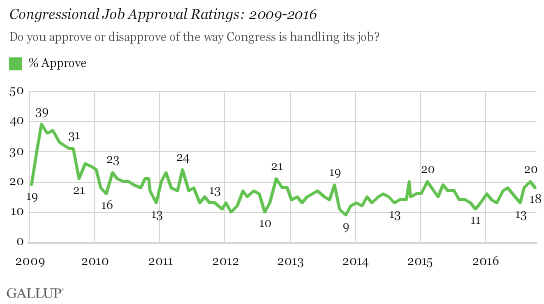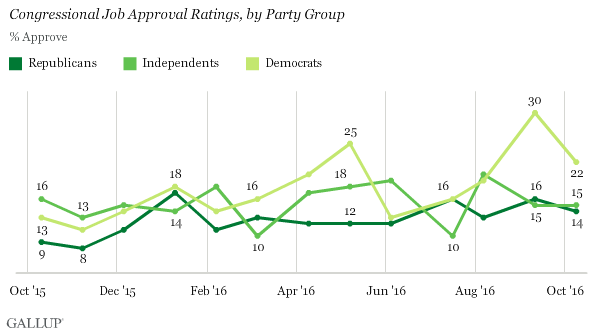Ahead of Elections, U.S. Congress Approval at 18%

Written by Justin McCarthy
With less than a month to go before the U.S. congressional elections, 18% of Americans approve of the job Congress is doing. This rating has been low for some time, and has not cracked 25% since 2009.

The latest figure, from an Oct. 5-9 Gallup poll, represents Americans’ final job approval rating of Congress before the November elections, and is similar to the ratings found in final pre-election polls in 2008, 2010, 2012 and 2014, when Congress approval ranged between 18% and 21%.
Republicans Remain Least Approving of Congress
Supporters of the majority party in Congress tend to rate the institution more favorably than do supporters of the minority party, but the GOP bucked the trend when its supporters’ approval did not improve after the party took the second chamber of Congress in 2014. Despite controlling both the House and Senate, Republicans (14%) are currently less likely than Democrats (22%) to approve of the job Congress is doing.

This could reflect the split between conservative and moderate Republicans in Washington that has been palpable throughout Barack Obama’s presidency. Regardless of the side on which national Republicans fall, their frustration with this breach could be affecting their approval of Congress as a whole.
Bottom Line
Many political observers believe Democrats have a reasonable chance of regaining party control of the Senate. Republicans, who won many Senate seats in a significant wave in 2010, are defending those same seats in 2016 — arguably in a less favorable political climate for the party than was the case six years ago. The GOP seems to have a better chance of holding its House majority, though even that could be in jeopardy if a Democratic wave emerges.
Since World War II, Congress’ party composition has generally changed most significantly in non-presidential election years, so while individual seats and control of each chamber may be in play, it’s likely that the overall party layout of Congress will not change drastically.
Article originally published at Gallup.com.












